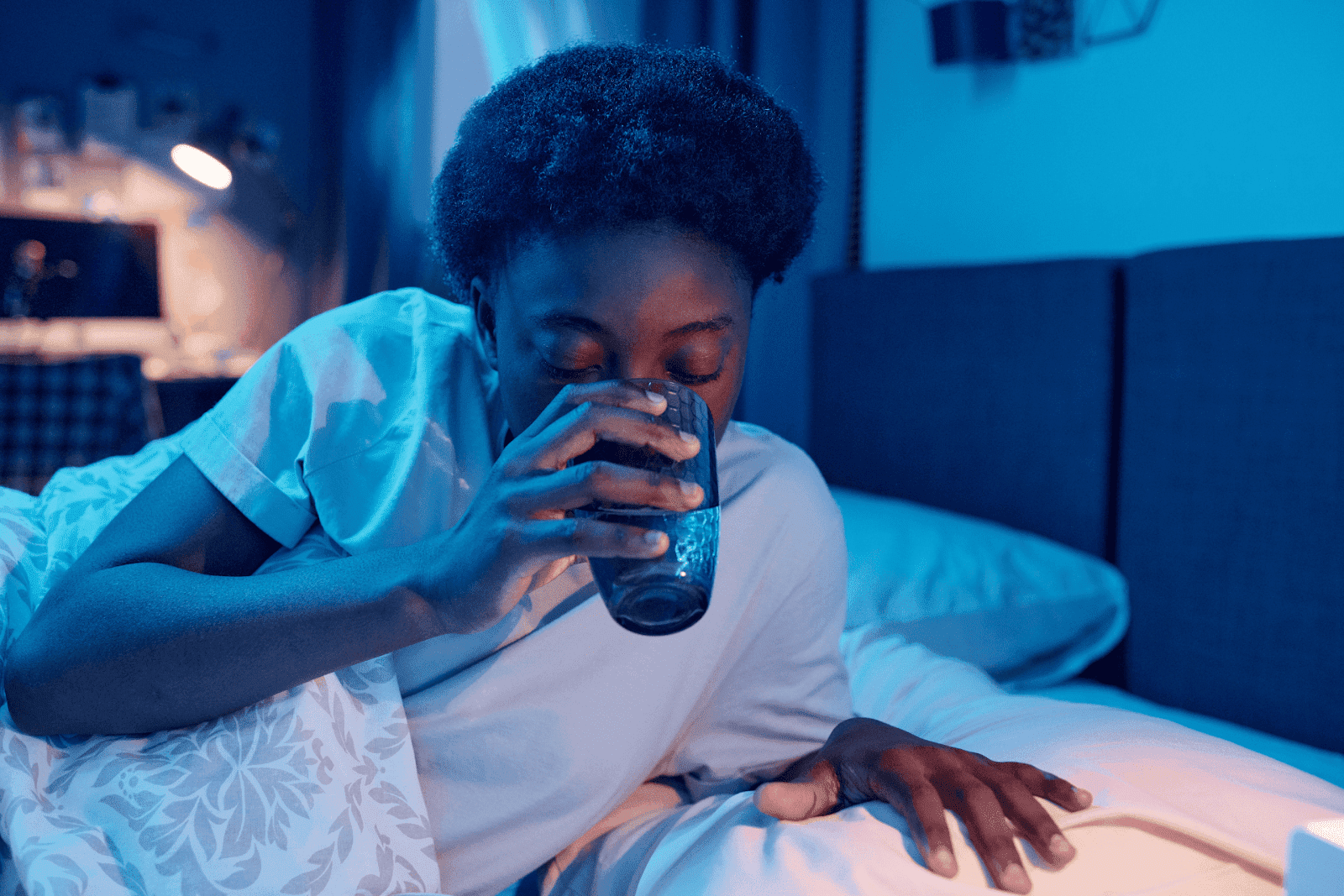Why Am I Always Thirsty at Night?
Waking up parched in the middle of the night is a common experience for many people. While it might seem like a minor annoyance, persistent nighttime thirst can sometimes [...]
Read More
Medically reviewed by Alan Lucks | MD, Alan Lucks MDPC Private Practice - New York on October 12th, 2025.
Mouth breathing during sleep reduces saliva production by up to 40%, leading to dry mouth and compensatory thirst—often caused by nasal congestion, sleep apnea, or sleeping in overly warm rooms.
Blood glucose levels above 180 mg/dL trigger excessive urination as kidneys attempt to filter out excess sugar, creating a dehydration cycle that peaks during nighttime hours when fluid intake naturally decreases.
Diabetes insipidus affects only 1 in 25,000 people but causes extreme nighttime thirst by preventing proper water retention—patients may drink 3-20 liters daily and wake multiple times to urinate.
ACE inhibitors, diuretics, and antihistamines can trigger nocturnal thirst within 2-4 hours of evening doses by either increasing fluid loss or reducing saliva production.
Consuming more than 2,300mg of sodium daily (about 1 teaspoon of salt) requires an additional 16-24 ounces of water for proper dilution, often creating delayed thirst that emerges hours after eating.
Waking up parched in the middle of the night is a common experience for many people. While it might seem like a minor annoyance, persistent nighttime thirst can sometimes signal underlying health issues or lifestyle factors that deserve attention. Understanding why you feel thirsty at night is the first step toward finding relief and ensuring your overall well-being.
Thirst is the body’s natural way of signaling the need for hydration. Several factors can contribute to feeling especially thirsty during the night, ranging from simple habits to medical conditions.
 Dehydration
DehydrationOne of the most straightforward reasons for nighttime thirst is dehydration. If you don’t drink enough fluids during the day or lose excessive fluids through sweating, diarrhea, or vomiting, your body will crave water. Since your body doesn’t receive fluids while you sleep, dehydration symptoms can become more noticeable at night. It’s important to note that even mild dehydration can lead to feelings of fatigue, headaches, and decreased cognitive function, which can significantly affect your overall well-being. To combat dehydration, consider keeping a water bottle by your bedside or setting reminders throughout the day to ensure you’re consuming adequate fluids.
Breathing through your mouth instead of your nose, especially during sleep, can cause dryness in your mouth and throat. This often leads to increased thirst. Conditions such as nasal congestion, allergies, or sleep apnea can contribute to mouth breathing and, subsequently, nighttime thirst. Moreover, dry air, particularly in winter months or in air-conditioned environments, can exacerbate this issue, leading to discomfort and a persistent need for hydration. Utilizing a humidifier in your bedroom can help maintain moisture in the air, potentially alleviating dry mouth and reducing nighttime thirst.
Consuming salty or spicy foods, caffeine, or alcohol close to bedtime can increase your thirst. These substances can dehydrate your body or irritate your digestive system, leading to increased thirst when you try to sleep. Additionally, high-sugar foods can lead to increased thirst by causing fluctuations in blood sugar levels, prompting your body to seek out more fluids. It’s advisable to be mindful of your evening snacks and drinks, opting for lighter, hydrating options such as fruits or herbal teas. This not only helps mitigate nighttime thirst but can also promote better sleep quality overall.
While occasional thirst is normal, persistent or intense thirst at night may indicate an underlying health issue. Recognizing these conditions early can help you seek appropriate care.
One of the most common medical reasons for excessive thirst, especially at night, is diabetes. High blood sugar levels cause your kidneys to work harder to filter and absorb the excess glucose, which leads to increased urination and dehydration. This cycle triggers intense thirst as your body tries to replenish lost fluids.
If you notice other symptoms such as frequent urination during the day, unexplained weight loss, fatigue, or blurred vision alongside nighttime thirst, it is essential to consult a healthcare professional promptly. Early diagnosis and management of diabetes can significantly improve quality of life and prevent complications such as cardiovascular disease, nerve damage, and kidney failure. Regular monitoring of blood sugar levels, a balanced diet, and adherence to prescribed medications play crucial roles in managing this condition effectively.
Less common but still significant, diabetes insipidus is a condition where the kidneys are unable to conserve water, leading to large volumes of diluted urine and intense thirst. Unlike diabetes mellitus, this condition is related to hormonal imbalances rather than blood sugar levels. The most prevalent form, central diabetes insipidus, is often caused by damage to the pituitary gland, which can result from head injuries, surgeries, or tumors.
Patients with diabetes insipidus may find themselves waking up multiple times during the night to drink water, disrupting their sleep patterns and leading to fatigue during the day. Treatment typically involves hormone replacement therapy or medications that help the kidneys concentrate urine more effectively, allowing for better hydration and improved overall well-being.
Conditions such as kidney disease, certain medications (like diuretics), and hormonal imbalances can also cause increased thirst. Additionally, infections or fever can lead to dehydration, making you feel thirsty at night. Chronic conditions such as hypercalcemia, where there is an excess of calcium in the blood, can also stimulate thirst and result in frequent urination.
Moreover, lifestyle factors such as high salt intake and excessive caffeine consumption can exacerbate nighttime thirst. It's essential to evaluate dietary habits and consider how they may contribute to your symptoms. Staying well-hydrated during the day and moderating intake of diuretics can help mitigate nighttime thirst and improve overall hydration status. If thirst persists despite these adjustments, further investigation into potential underlying health issues is warranted.
Occasional thirst at night is usually not a cause for alarm. However, if you experience persistent or severe thirst that disrupts your sleep, it’s important to pay attention to accompanying symptoms and seek medical advice. Nighttime thirst can sometimes be a simple result of dehydration or environmental factors, such as dry air in your bedroom or excessive heat. Yet, when it becomes a frequent occurrence, it may signal underlying health issues that warrant further investigation.
Frequent urination, especially if it occurs both day and night
Unexplained weight loss or fatigue
Blurred vision or headaches
Dry mouth and skin despite adequate hydration
Increased hunger or sudden changes in appetite
These signs may indicate a need for diagnostic testing to rule out conditions like diabetes or kidney problems. Diabetes, for instance, can lead to a condition known as polydipsia, where the body feels an unquenchable thirst due to high blood sugar levels. Similarly, kidney issues can affect your body's ability to concentrate urine, leading to increased fluid loss and, consequently, a heightened sense of thirst. It’s crucial to monitor these symptoms closely, as they can provide valuable insights into your overall health.
Additionally, lifestyle factors such as diet, exercise, and stress levels can also contribute to nighttime thirst. Consuming high-sodium foods, for example, may leave you feeling parched, while a sedentary lifestyle can impact your metabolic health. If you find that lifestyle changes or patterns accompany your thirst, it may be beneficial to reflect on your daily habits and consider adjustments that promote better hydration and overall well-being. Keeping a journal of your symptoms and any related lifestyle factors can also be a useful tool when discussing your concerns with a healthcare professional.
Addressing nighttime thirst often involves a combination of lifestyle adjustments and, if necessary, medical treatment. Here are some practical tips to help reduce your symptoms.
Drinking enough water during the day is essential. Aim for consistent hydration rather than trying to make up for it all at night. Avoid excessive caffeine and alcohol, especially in the evening, as they can dehydrate you.
If dry mouth is an issue, consider using a humidifier in your bedroom to add moisture to the air. Nasal strips or allergy treatments may help if nasal congestion causes mouth breathing.
Limit salty and spicy foods before bedtime. These can increase thirst and cause discomfort during the night.
If lifestyle changes don’t alleviate your symptoms, or if you experience other concerning signs, it’s important to seek professional advice. Telehealth services like Doctronic.ai provide convenient access to medical consultations from the comfort of your home. Their AI-powered platform offers quick, evidence-based answers and can guide you on the next steps, whether that means lifestyle advice or further medical evaluation.
Doctronic.ai is revolutionizing healthcare by combining cutting-edge artificial intelligence with personalized medical knowledge. If you find yourself frequently thirsty at night and want to understand the potential causes, Doctronic’s AI doctor can provide a comprehensive evaluation in seconds.
Unlike generic health information websites, Doctronic’s AI draws on the latest peer-reviewed medical research to give you accurate, up-to-date advice tailored to your symptoms. It remembers your health history, so every interaction is more personal and precise. Plus, if you need to speak with a human doctor, Doctronic offers affordable telehealth video visits 24/7 across all 50 states, making quality care accessible whenever you need it.
Visit Doctronic.ai today to get started on addressing your nighttime thirst and any other health concerns with confidence and convenience.
 From Dry Nights to Daily Wellness: Managing Thirst Wisely
From Dry Nights to Daily Wellness: Managing Thirst WiselyFeeling thirsty at night is a signal from your body that should not be ignored, especially if it happens frequently or is accompanied by other symptoms. While lifestyle factors often play a significant role, persistent thirst can also point to medical conditions that require attention.
By staying hydrated, maintaining healthy habits, and seeking timely medical advice through innovative platforms like Doctronic.ai, you can manage nighttime thirst effectively and protect your overall health. Remember, your body’s signals are valuable clues, and listening to them is the first step toward better well-being.
If you're concerned about your nighttime thirst or any other health issues, Doctronic is here to help. Experience the fastest, most personalized medical advice from the #1 AI Doctor. With over 10 million satisfied users and growing, our AI-powered platform offers free, instant doctor visits that remember your health history for a truly personalized experience. For more in-depth care, our telehealth video visits provide access to professional doctors 24/7 in all 50 states, at less than $40. Don't wait in line for answers. Talk to an AI Doctor Now, for free.
Occasional nighttime thirst usually stems from dehydration or environmental factors, but persistent thirst combined with frequent urination, fatigue, or unexplained weight changes warrants medical evaluation. Track your fluid intake and symptoms for 1-2 weeks to identify patterns before seeking care. If you're experiencing concerning symptoms alongside excessive thirst, Doctronic can help you determine when professional evaluation is needed.
Waking up parched in the middle of the night is a common experience for many people. While it might seem like a minor annoyance, persistent nighttime thirst can sometimes [...]
Read More